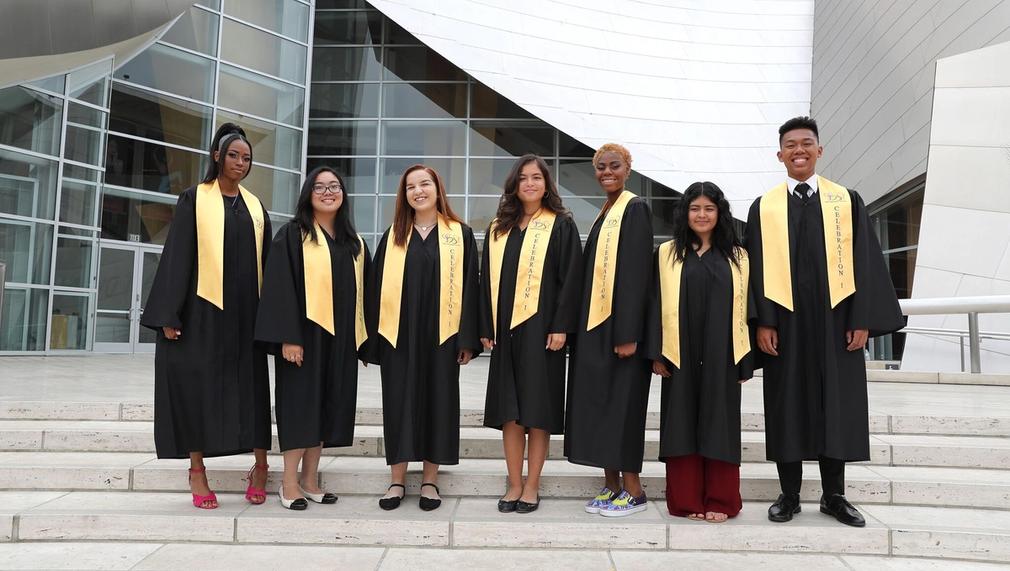Foster Youth Equity Through Financial Empowerment
United Friends of the Children and TWINSPIRE are partnering to provide financial literacy workshops to 50 youth in Los Angeles County’s foster care system. Participants will gain valuable knowledge and economic opportunities to disrupt generational poverty. Led by former foster youth and financial expert, Demonte “Tray” Thompson, TAY foster youth (ages 16-24) will participate in cohort-based workshops designed to increase the financial health and stability of foster youth as they transition to college and adulthood.

In which areas of Los Angeles will you be directly working?
County of Los Angeles
What is the problem that you are seeking to address?
Each year, youth in LA County’s foster care system emancipate into young adulthood ill prepared for life on their own. High school graduation rates are significantly lower than their non-foster peers (58% vs. 81.6%), only 3-7% will ever matriculate and earn a bachelor degree, and foster youth continue to be overrepresented in LA’s annual homeless counts. Additionally, the foster care system is racially biased against the Black community with Black youth making up just 7% of the overall youth population, yet 24% of youth in LA’s foster care system. This project seeks to increase the financial literacy and management skills of transition age foster youth (16-24) to immediately improve their educational and life situations. Studies have shown a better understanding of how and why to pay for training and education after high school increases the likelihood of degree completion, career fulfillment, and manageable debt (Texas Higher Education Coordinating Board, 2017).
Describe the project, program, or initiative that this grant will support to address the problem identified.
TWINSPIRE Financial Literacy Program will host a Financial Literacy workshop every two weeks over a week 2-month period. An initial Intake Survey will be used to understand the current needs of the students and tailor the material to meet them where they are. Target youth will be transition age foster youth in UFC’s education and housing programs. Each session we will include community builders, financial literacy curriculum and activities, and Q&A time. Participants who complete the entire workshop series will receive a $200 “investment” stipend to use toward establishing financial stability (savings account, college tuition, work readiness, etc.) Workshop topic schedule includes: Session 1: Intake Survey and Review Session 2: Budgeting Session 3: Credit Cards & Debt Management Session 4: Credit Reports & Scores Session 5: Identity Theft / Social-emotional goal setting Session 6: Workforce Development / Career Exploration Session 7: One-on-One Sessions Session 8: Program Graduation UFC staff will be provided a two-day financial counseling training provided by TWINSPIRE. Staff members will receive an overview of personal financial literacy and management skills necessary for young adults to become self-sufficient. Staff members will integrate training components into current case management and workshops.
In what stage of innovation is this project, program, or initiative?
Pilot or new project, program, or initiative
Approximately how many people will be impacted by this project, program, or initiative?
Direct Impact: 50
Indirect Impact: 580
Describe how Los Angeles County will be different if your work is successful.
In the long-term, this project will create stronger communities and neighborhoods throughout LA County by providing youth with the knowledge and skills needed to create generational wealth in the places and families where they live, work, and go to school. This will be achieved by increasing the financial independence and self-sufficiency of foster youth. Rather than suffering from the effects of poor money management or lack of financial advice, youth will be able to create balanced personal budgets and achieve their financial goals including establishing strong credit histories, opening checking and savings accounts, financing higher educational degrees, securing a livable wage job/career, and eventual homeownership. By building the blocks of financial stability, foster youth participants will transition from recipients of public assistance, to self-sufficient community members investing their time, talents, and resources back into their local economies, families, and neighborhoods.
What evidence do you have that this project, program, or initiative is or will be successful, and how will you define and measure success?
This project will be an extension of UFC’s existing programs, Scholars (education-focused) and Pathways to Independence (transitional housing for TAY foster youth). UFC will leverage the financial expertise of TWINSPIRE to build the financial literacy and health of TAY foster youth as they pursue higher education and/or a stable life after experiencing homelessness. While outcomes for youth in UFC's programs are significantly higher than their foster peers, a comprehensive understanding of personal finances is currently not being provided by UFC. Outcomes measures will include: 1. 85% of youth will complete all workshop sessions 2. College-focused youth will have student loan repayment plans consisting of 8-10% of expected gross monthly income 3. 100% of program participants will have a personalized budget and spending plan 4. 100% of program participants will receive credit score and report 5. 100% of UFC staff participants will increase their ability to financially counsel youth
Describe the role of collaborating organizations on this project.
Twinspire is the collaborating partner for the project and will provide financial literacy workshop curriculum and facilitation. Tray Thompson, a founding member of Twinspire and former foster youth will facilitate group workshops. Tray brings a professional background in finance and lived experience that will benefit youth in UFC’s programs. United Friends will provide workshop space, free transportation to all program participants and/or technology (laptops and wifi) if conducted virtually, and logistics support.
Which of the LEARN metrics will you impact?
College graduates
College matriculation
High school graduation rates